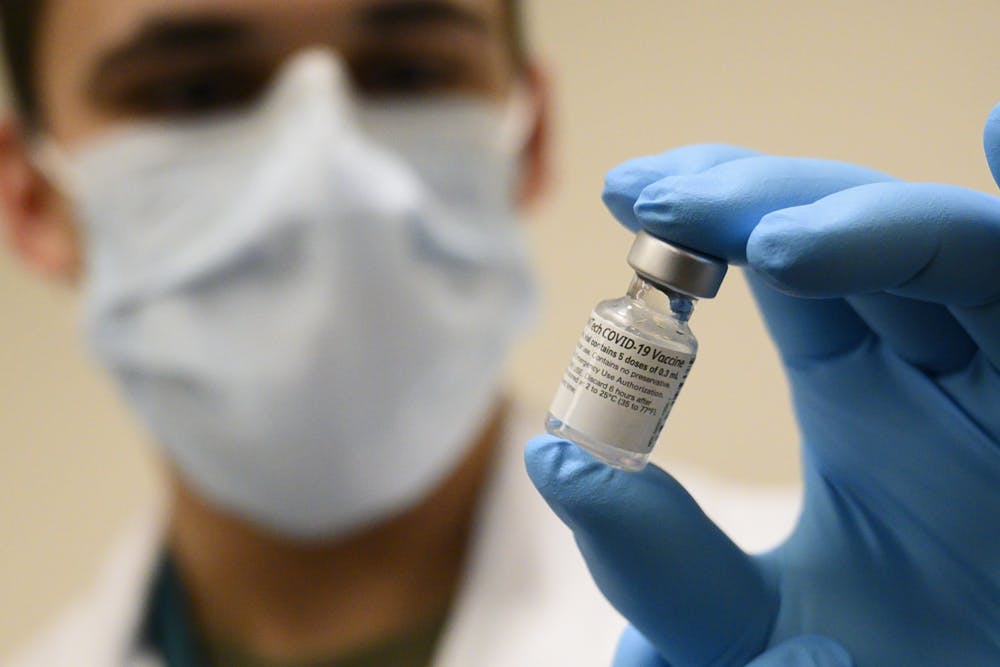The pandemic has led to a global reckoning, testing not only the strength of government institutions and leaders but also the very definition of human worth. In a race against mutations and transmission, world leaders are attempting to accomplish mass vaccinations, hoping that the scale of distribution will encompass the entire planet.
On Dec. 11, 2020, the Pfizer-BioNTech vaccine was awarded emergency use authorization by the U.S. Food and Drug Administration (FDA), providing some hope for our fates in this historical era. Since then, the Moderna COVID-19 vaccine has also been authorized by the FDA. Johnson & Johnson is closely following with ongoing trials of their Janssen vaccine. Globally, a slew of doses from AstraZeneca, Covaxin, BBIBP-CorV and many others have been successfully authorized.
But consequently, upon solving the issue of lack of a vaccine, a whole new subset of issues opens up: How should vaccines be distributed?
Along with possible structural issues in storing and distributing the various vaccines in the market, the supply itself is a scarce resource. Production capabilities are limited and nowhere near the demand presented by the global population. As a result, vaccine distribution internationally is a testament to “the brink of a catastrophic moral failure,” according to Tedros Adhanom Ghebreyesus, director-general of the World Health Organization (WHO). In fact, of all the vaccines distributed, 75% have been administered in just 10 countries.
Fortunately, vaccines have rolled out in at least 87 countries. But while most Americans will become immunized by late 2021, widespread meaningful vaccination coverage in middle-income and poorer nations will only be achieved in late 2022 and even early 2023. Wealthier nations have bought out most of the supply, with enough doses in their hoards to immunize their populations a total of three times by 2021.
The distribution of vaccines in Africa particularly is problematic, with the South African government labeling the event a “vaccine apartheid.” The simple fact is that the action of investing in research and development, buying out the immunization stock or even noticing the current state infrastructure solidifies the boundaries between the haves and the have-nots. This apparent disparity could “prolong the pandemic, the restrictions needed to contain it, and human and economic suffering,” according to WHO.
WHO developed the COVID-19 Vaccines Global Access (COVAX) pillar to facilitate a collaborative theater to combat this disparity in vaccine research and development, acquisition and rollout. Formed with an understanding that wealthier nations intrinsically have increased buying power, COVAX attempts to eliminate the competitive vaccine market by pooling the buying powers of all nations involved to collectively invest in aspects of vaccine management.
Equitable access is bolstered as they promise doses for at least 20% of a given nation’s population, a percentage unattainable for some without participation in the pillar system. Even wealthy nations benefit to some degree considering the collective investment of COVAX could directly lead to increased access to dosages for citizens at a faster rate.
Despite enacting plans to minimize competition, the issue of production and physical unit scarcity remains and is actively being capitalized upon. Attempting to mediate this issue, Russia and China have both developed and produced respective vaccines: Sputnik V from Russia and Sinopharm and Sinovac from China.
Both nations are offering jabs to countries that will submit to supply deals, essentially enforcing pre-existing or newfound allyship. Considering that neither Russia nor China has the capability to produce for its own domestic markets, exporting to other nations certainly seems to be a strategy for global leverage and expansions of soft power.
These independent interests and approvals also air out a lack of some cohesive system to ensure standardized vaccine efficacy or corroborate efficacy with a circulating variant. Some degree of standardization would promote both full transparency and the public’s confidence in inoculation. Unfortunately, the lack of leadership from various foreign powers at the onset of this pandemic has certainly exacerbated this “me first” mentality.
But the increase in international equity of vaccine distribution must continue. As WHO states, “no one is safe, unless everyone is safe.”
Anju Felix is a dual-degree sophomore studying Neuroscience, Political Science and Harp performance from Port Murray, N.J. She is a writer for the Triple Helix scientific journal.





